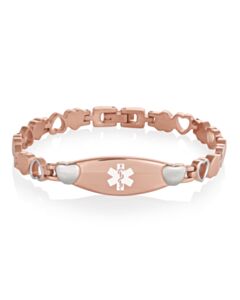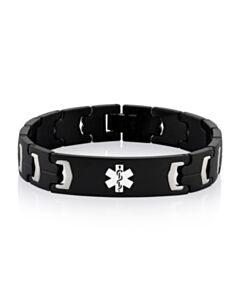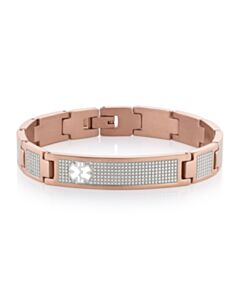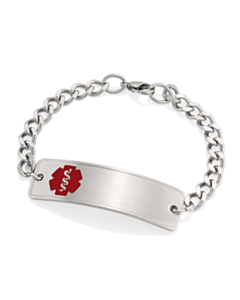

Medical Alert IDs for EpiPen Injectors
A medical ID is recommended to anyone who uses an EpiPen or Epinephrine autoinjector. EpiPens are a medical device used to treat severe allergic reactions, such as anaphylaxis. Each injector contains epinephrine, a life-saving medication that can help reverse symptoms of an allergic reaction.
In 2015 alone, an estimated 3.6 million people in the US were prescribed an EpiPen. Common severe allergy triggers that may require EpiPen administration include food, insect sting, or medication allergy, and asthma. In an emergency, signs that a person carries or needs an EpiPen are not readily visible to responders unless a patient wears an EpiPen bracelet/Anaphylaxis Bracelet or necklace to alert others.
"Times when you need to use an EpiPen can be stressful and may even be life-threatening, so it is important to have a plan of action so you can calmly react to the situation...The longer you wait to administer an EpiPen, the harder it is to stop an allergic reaction, mild or severe, and allergic reactions can change from mild to fatal, quickly." - Nationwide Childrens Hospital
When EpiPen Injections are Needed
A person prescribed epinephrine injectors should carry their EpiPen at all times. It must be used immediately at the first signs of a severe allergic reaction or anaphylaxis. These warning signs include:
- Swelling of the mouth, lips, or tongue
- Swelling in the throat
- Swelling around the face, especially around the eyes
- Difficulty breathing
- Increased heart rate, chest pain, and decreased blood pressure
Medical IDs and EpiPen in Emergencies
Anaphylaxis, a severe form of an allergic reaction, can be fatal. It is a life-threatening emergency that requires quick action.
A study shows that anaphylaxis is common in the US and occurs in about 1 in 50 Americans. The most common anaphylactic reactions that require EpiPen administration are to foods, insect stings, medications, and latex. However, these allergies, including asthma, are invisible medical conditions. They do not have visible symptoms making it difficult for responders to recognize in an emergency.
More so, a patient may collapse and lose consciousness during an allergic reaction. An EpiPen medical bracelet (anaphylaxis medical bracelet) can alert medical professionals to the type of allergies and the fact that the patient has or needs epinephrine, even if they are unable to communicate.
"Wear a medical ID bracelet. It should let others know about your allergy and what to do in an emergency...Show them how to use the epinephrine autoinjector." - Saint Luke's
Common Side Effects of EpiPen
Because EpiPen contains epinephrine, side effects may include an increase in heart rate, stronger or irregular heartbeat, sweating, nausea and vomiting, difficulty breathing, and more. While these side effects usually go away quickly, a medical ID can help emergency responders know that these reactions are due to EpiPen use and not a heart condition.
- Dizziness
- Anxiety
- Feeling nervous or fearful
- Headache
- Restlessness
- Vomiting
- Shaking
- Sweating
What to put on an EpiPen/Anaphylaxis Medical ID


A medical ID for EpiPen can alert medical professionals of everything they need to know about your allergy, asthma, and epinephrine injector. A custom-engraved bracelet or necklace can alert others that the administration of EpiPen is needed and who they should call in an emergency.
Here are some of the most important items to put on an EpiPen medical ID:
- Name
- Your allergy or asthma
- EpiPen medications – alert others if you carry an EpiPen or epinephrine injector and that you need it in case of a severe allergic reaction.
- Emergency Contact
Our EpiPen Bracelet & Wristband Options
Since our medical ID jewelry are customizable, any bracelet or necklace can be used as an allergy alert medical ID. Here are four popular options that customers use for EpiPen/anaphylaxis bracelets.
Frequently Asked Questions About EpiPen/Anaphylaxis Medical ID Jewelry
Should I wear a medical alert bracelet for anaphylaxis?
Yes, you should wear a medical alert bracelet if have severe allergic reactions. Including the location of your EpiPen is critical for first responders to help in an emergency situation.
What should I engrave if I carry an epipen?
The words “EpiPen” or “Epi” will be recognizable by first responders. Include the location of your EpiPen, such as your purse, bag, etc.
Should I still carry an allergy card if I wear an epipen alert or anaphylaxis alert bracelet?
A medical ID card (expandable wallet card) provides helpful information that doesn’t always fit within the engraving space of a medical ID bracelet or necklace. Within your expandable wallet card you can include full details that can help medical professionals understand your needs before rushing to a treatment.
"A medical identification bracelet that describes the allergy and need for emergency care can help if you experience anaphylaxis and can't communicate." - Mayo Clinic



 - UK
- UK  - Canada
- Canada  - Australia
- Australia 



